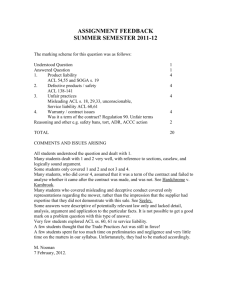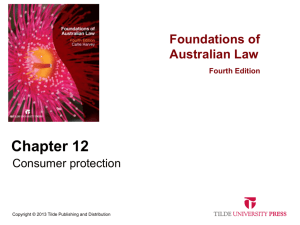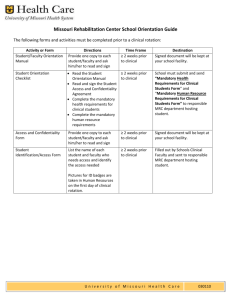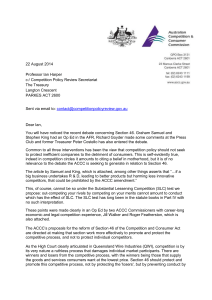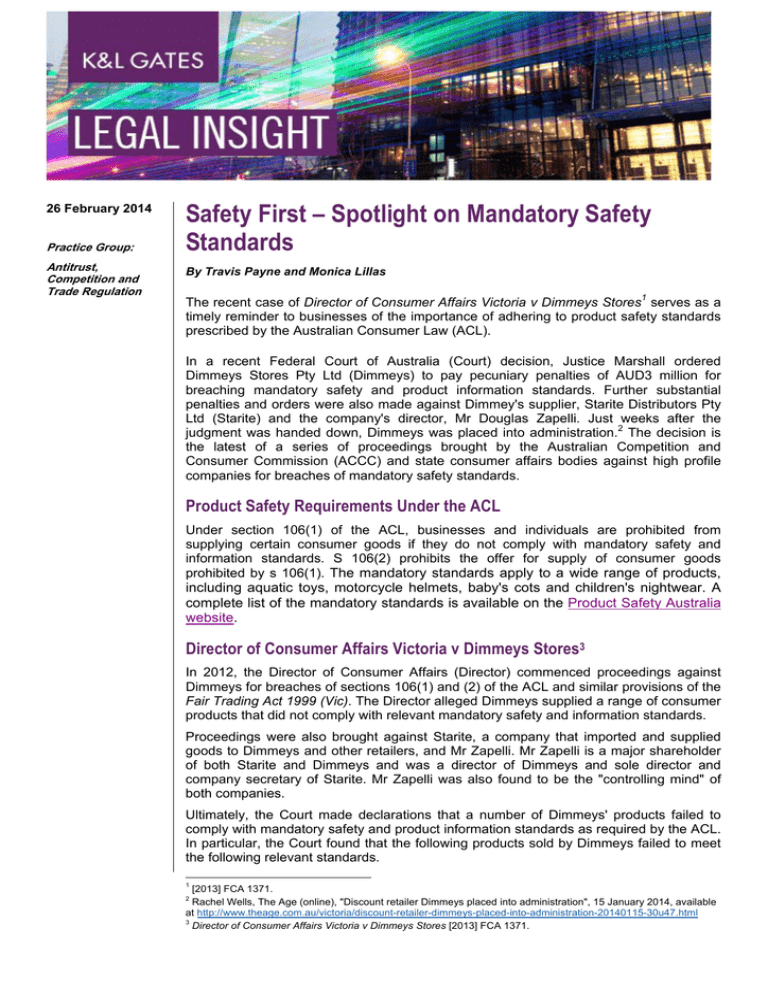
26 February 2014
Practice Group:
Antitrust,
Competition and
Trade Regulation
Safety First – Spotlight on Mandatory Safety
Standards
By Travis Payne and Monica Lillas
The recent case of Director of Consumer Affairs Victoria v Dimmeys Stores1 serves as a
timely reminder to businesses of the importance of adhering to product safety standards
prescribed by the Australian Consumer Law (ACL).
In a recent Federal Court of Australia (Court) decision, Justice Marshall ordered
Dimmeys Stores Pty Ltd (Dimmeys) to pay pecuniary penalties of AUD3 million for
breaching mandatory safety and product information standards. Further substantial
penalties and orders were also made against Dimmey's supplier, Starite Distributors Pty
Ltd (Starite) and the company's director, Mr Douglas Zapelli. Just weeks after the
judgment was handed down, Dimmeys was placed into administration.2 The decision is
the latest of a series of proceedings brought by the Australian Competition and
Consumer Commission (ACCC) and state consumer affairs bodies against high profile
companies for breaches of mandatory safety standards.
Product Safety Requirements Under the ACL
Under section 106(1) of the ACL, businesses and individuals are prohibited from
supplying certain consumer goods if they do not comply with mandatory safety and
information standards. S 106(2) prohibits the offer for supply of consumer goods
prohibited by s 106(1). The mandatory standards apply to a wide range of products,
including aquatic toys, motorcycle helmets, baby's cots and children's nightwear. A
complete list of the mandatory standards is available on the Product Safety Australia
website.
Director of Consumer Affairs Victoria v Dimmeys Stores3
In 2012, the Director of Consumer Affairs (Director) commenced proceedings against
Dimmeys for breaches of sections 106(1) and (2) of the ACL and similar provisions of the
Fair Trading Act 1999 (Vic). The Director alleged Dimmeys supplied a range of consumer
products that did not comply with relevant mandatory safety and information standards.
Proceedings were also brought against Starite, a company that imported and supplied
goods to Dimmeys and other retailers, and Mr Zapelli. Mr Zapelli is a major shareholder
of both Starite and Dimmeys and was a director of Dimmeys and sole director and
company secretary of Starite. Mr Zapelli was also found to be the "controlling mind" of
both companies.
Ultimately, the Court made declarations that a number of Dimmeys' products failed to
comply with mandatory safety and product information standards as required by the ACL.
In particular, the Court found that the following products sold by Dimmeys failed to meet
the following relevant standards.
1
[2013] FCA 1371.
Rachel Wells, The Age (online), "Discount retailer Dimmeys placed into administration", 15 January 2014, available
at http://www.theage.com.au/victoria/discount-retailer-dimmeys-placed-into-administration-20140115-30u47.html
3
Director of Consumer Affairs Victoria v Dimmeys Stores [2013] FCA 1371.
2
Safety First – Spotlight on Safety Standards
Girls swimming aid vests and flotation devices that did not carry the requisite
warning label.
Baby bath squeeze toy sets that contained small components that could be
separated from the toy and pose a choking hazard.
Cosmetic sets that did not contain the required list of ingredients on the
containers of the products.
Basketball rings that were sold in packages that did not contain the required
warning and warning symbol, nor any warning label affixed to the product itself.
The Court found that Dimmeys lacked appropriate systems for checking imported
products for compliance with Australian safety standards. It viewed each of the above as
separate contraventions of the ACL and went on to make significant pecuniary penalty
awards against all three defendants.
In considering the appropriate penalty award to be made, the Court emphasised that
deterrence was "the primary consideration in fixing penalties in matters of this type."
Justice Marshall noted the company as having a poor record of compliance with its
consumer protection obligations,4 citing proceedings brought against Dimmeys in 1999,
2001 and 2011 concerning the supply of children's bicycle helmets, night wear and
dressing gowns that did not comply with the relevant standards.
The Court acknowledged that the contraventions were not deliberate but nonetheless,
deemed a high range penalty appropriate in light of Dimmeys' previous non-compliant
conduct. The Court also considered whether Dimmeys had a corporate culture conducive
of compliance with the ACL and found that remedial measures put in place in recent
years had not borne fruit.
Justice Marshall acknowledged the financial difficulty that might be placed on Dimmeys
by a large penalty but nevertheless stated that a high penalty was required
notwithstanding that it may threaten the viability of the company.5 The Court imposed a
fine of AUD3 million on Dimmeys with the penalty payable in instalments over an 18
month period.
In addition, Starite was ordered to pay AUD600,000 on the basis that it supplied the noncompliant goods and must take its share of the blame for what ensued.
Mr Zapelli, was ordered to pay AUD120,000 and was disqualified for a period of six years
from managing corporations.
The Court also ordered injunctive relief against Dimmeys and Starite, restraining both
companies from selling goods which are subject to safety standards, interim or
permanent ban orders or information standards under the ACL for a period of six years.
Each company was also required to publish an Important Public Notice in a form
prescribed by the Court in four newspapers, in store, on its website and in its catalogues.
The Court also ordered that the goods be destroyed and disposed of, at the defendants'
cost, and that the parties pay the Director's legal costs incurred in the proceeding.
Product Recalls – The Power of Deterrence
As highlighted by the Dimmeys case, businesses can face significant and often
draconian consequences for contravening the mandatory standards prescribed by
the ACL.
4
5
Director of Consumer Affairs Victoria v Dimmeys Stores [2013] FCA 1371, [35].
Director of Consumer Affairs Victoria v Dimmeys Stores [2013] FCA 1371, [58] – [59].
2
Safety First – Spotlight on Safety Standards
In addition to court proceedings, parties that contravene mandatory or information
standards also face the likelihood of product safety recalls pursuant to s 122 of the
ACL. Recalls can be both an expensive and time consuming exercise for business
and present serious reputational and publicity risks. Despite this, product safety
recalls (mandatory and voluntary) are now commonplace, with the ACCC reporting
that more than two million hazardous products have been removed from the market
through 450 product safety recalls in the 2012-2013 financial year.6
Product safety recalls are published on the Product Safety Recalls Australia website
and the ACCC's Consumer Product Safety Recall Guidelines are available here.
Businesses should also be aware that there are mandatory reporting requirements
that require suppliers to notify the ACCC of incidents where a person has received a
serious injury associated with a consumer product.7 The ACCC now receives over
2500 mandatory reports every year.
Implications for Business
Speaking at the International Consumer Product Health & Safety Organisation
Symposium in October 2013, ACCC Chairman Rod Sims emphasised that "product
safety is an enduring enforcement and compliance priority for the ACCC."8
With this in mind and in light of the Dimmeys decision, businesses should take steps to
ensure that they have a sound compliance strategy in place, which should include:
maintaining a library of relevant and up-to-date product safety standards
ensuring a designated staff member (eg your compliance officer) is familiar with
these standards
checking all inbound goods, particularly from overseas, for compliance with
relevant safety standards
securing periodical training to maintain up to date knowledge of new standards,
updated standards and current industry issues
development/review of product safety recall procedures.
K&L Gates has assisted a range of clients in respect to their compliance with product
safety and information standards and in responding to product safety issues generally.
Authors:
Travis Payne
travis.payne@klgates.com
+61.3.9640.4363
Monica Lillas
monica.lillas@klgates.com
+61.3.9640.4264
6
ACCC Annual Report 2012 – 2013, page 60.
section 201, Competition and Consumer Act 2010 (Cth), Schedule 2, Australian Consumer Law.
8
Keynote Address: ICPHSO Asia-Pacific Symposium, Gold Coast, 9 October 2013
http://www.accc.gov.au/speech/keynote-address-icphso-asia-pacific-symposium
7
3
Safety First – Spotlight on Safety Standards
Anchorage Austin Beijing Berlin Boston Brisbane Brussels Charleston Charlotte Chicago Dallas Doha Dubai Fort Worth Frankfurt
Harrisburg Hong Kong Houston London Los Angeles Melbourne Miami Milan Moscow Newark New York Orange County Palo Alto
Paris Perth Pittsburgh Portland Raleigh Research Triangle Park San Diego San Francisco São Paulo Seattle Seoul Shanghai
Singapore Spokane Sydney Taipei Tokyo Warsaw Washington, D.C. Wilmington
K&L Gates practices out of 48 fully integrated offices located in the United States, Asia, Australia, Europe, the Middle East and
South America and represents leading global corporations, growth and middle-market companies, capital markets participants and
entrepreneurs in every major industry group as well as public sector entities, educational institutions, philanthropic organizations
and individuals. For more information about K&L Gates or its locations, practices and registrations, visit www.klgates.com.
This publication is for informational purposes and does not contain or convey legal advice. The information herein should not be used or relied upon
in regard to any particular facts or circumstances without first consulting a lawyer.
©2014 K&L Gates LLP. All Rights Reserved.
4

